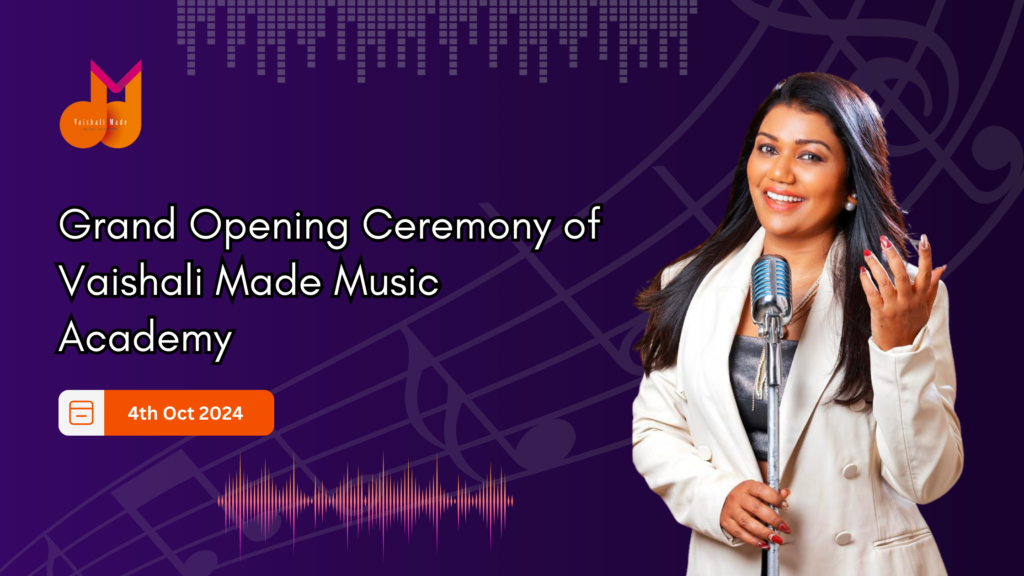Content Table
1. Why Classical Singing Techniques Are Important
2. Primary Techniques of Western Classical Singing
3. Key Classical Singing Techniques
4. Emotion and Expression in Classical Singing
5. Challenges Common in Classical Singing and How to Relieve Them
6. The Importance of a Mentor and Structured Learning
7. The patience, persistence, and practice: the keys to mastering classical singing.
1. Why Classical Singing Techniques Are Important
There is more than natural gift involved. Instead, there is a need for well-practiced efforts for the development of technical knowledge that would help show deeper understanding of musical expression. Whether a vocalist or refining your voice as a skilled artist, mastering techniques in classical singing will transform your performance and voice. At Vaishali Made Music Academy, we practice all these techniques in a structured class with an appropriate structure that could cater to every student and their goals and capabilities.

In this comprehensive course, we will go through all the basic and advanced techniques of classical singing. We will touch base on all general issues and get a glimpse into how to develop technical ability along with emotional depth as an artist.
Classical singing becomes the bedrock of many vocal styles-from Western opera to traditional Indian classical music. It calls for a lot of vocal control, breath management, and understanding of musical nuances. These techniques allow singers the ability to give performances that are not only technically perfect but also emotionally impactful.
Unlike the present pop singing, the classical singing is strongly based on the training discipline to realize the freedom of the voice. The singers have to learn how to sing without straining but with consistency in tone while displaying powerful expressions with the help of music. With singing classes at Vaishali Made Music Academy at Goregaon, these core techniques are dug up for development purposes so that those attending have acquired skills that are proficient enough to excel in any kind of classical genre.
2. Primary Techniques of Western Classical Singing
Before delving into more refined discussions on classical singing, one should have a good foundation. Vaishali Made Music Academy teaches base techniques and reminds the importance of mastery in primary techniques. These are core techniques of classical singing and must be practiced persistently to not damage one’s voice and gain constant development.
2.1 Breath Control and Support
Perhaps the most important skill in classical singing is breath control. This allows singers to hold phrases for as long as needed, maintain volume, and also be able to continue powerful performances without vocally and physically tiring. For this reason, phrases can often be lengthy in classical music, requiring the singer to efficiently manage his breath.
At Vaishali Made Music Academy, we teach students diaphragmatic breathing techniques that augment lung capacity and vocal endurance. Diaphragmatic breathing puts the voice under the control of the diaphragm muscle rather than using shallow chest breathing, which limits the ability of a singer to sing long phrases or project with power. The deep breathing exercises instruct students to control airflow that in itself supports the voice for stability in pitch and clarity of tone.
Support of breath is just as important. That is to say, the current airflow enables you to achieve a certain sound which, on the one hand is stable, and, on the other hand, is maintained in time. During our vocal classes, we use a set of exercises that are directed to regulate the breath: breath-holding, breathing out gradually and managing of breath pressure, among others, all of these would be useful for you in mastering this essential technique.
2.2 Posture and Alignment
One of the most basic requirements of classical singing is posture. Proper body alignment is needed for good breath control and resonance. Poor posture will eventually limit the airflow, which causes uneven force and, thereby, poor sound quality.
We at Vaishali Made Music Academy teach the student to be relaxed with the shoulders down, having a straight spine and feet shoulder width apart. This space in the chest and abdominal area allows for deep diaphragmatic breathing necessity for letting the vocal cords vibrate sonorously and strain-free and tension .
2.3 Vocal Warm-ups and Scales
Just like any athlete, singers have to warm up the instruments-their voice-before the intense practicing or performance. The vocal warmups help avoid that strained feeling and improve flexibility; the voice is prepared for anything in a big dynamic range and pitches.
We make sure every singing class in our academy begins with vocal warm-ups that are suited to the vocal range and needs of every student. Trained vocalists would generally warm up with lip trills, humming, and more advance warm-ups in regard to going through all the scales, which usually stretches the voicing strings slowly and very effectively develops stamina. Singing scales is one way to successfully improve pitch precision, agility, and control. Scales enable singers to get to know their range very well, so they may try expressing in greater comfort both within the upper and the lower registers.
Since our basis at Vaishali Made Music Academy is to let the students practice these primary techniques daily, the more regularly you would do breath control, posture, and warmups, the smoother your voice will sound. Therefore, you are assured of being flexible and having stamina for classical singing.
3. Key Classical Singing Class Techniques
Once the basic skills have been learned and mastered, advanced vocal techniques giving singers depth and richness of voice can be undertaken. These techniques facilitate projective voices, an effective conveyance of emotion through music, and the singing of really dramatic pieces of classical music.
3.1 Resonance and Tone Production
One of the distinguishing features of classical singing, in comparison with other voiced styles, is resonance. That is the richness and fullness a singer’s voice has. Resonance is a phenomenon whereby the sounds produced as waves by the vocal cords are amplified while passing through the various resonating chambers located in the body, mouth, throat, and chest. This kind of resonance gives your voice depth, warmth, and power.
Here at Vaishali Music Academy, we teach students about balancing the head voice-head range and the chest voice chest range to obtain a well rounded resonant tone. Practicing exercises will focus on regulating airflow and directing the placement of the sound within the head or chest to develop resonance.
Resonance is closely related to tone production. Clear, consistent and without strain are some of the characteristic features of a well produced tone. The exercises for tone production at our academy cater to building up a sound that is both smooth as well as powerful, by which a student can project his voice with clarity and precision.
3.2 Diction and Pronunciation
Thus, diction, or clear articulation, is of utmost importance to the classical singer while singing in a language like Hindi or Marathi or, indeed, any other language such as Sanskrit, or when singing any Western classical piece in Latin, Italian, or French. The audience needs to understand the words being sung, and even a very fine performance may be undermined by poor diction.
Sounding at Vaishali Made Music Academy placed significant value on elocution. Students were instructed to speak vowels clear and sharp while pronouncing the consonants. Not only should words be pronounced but also said as if the speaker is imbued with the emotional weight. Appropriate elocution also helps in maintaining the text’s efficacy, especially when done intricately in classical pieces.
3.3 Vocal Range Building
Actually, with classical singing, one needs to master how to sing very high notes and equally low notes as well. The more expansive your vocal range is, the more difficult compositions you can sing and the more one’s repertoire is. But on the other hand, the risk of such an approach is that it may lead you to overstretch your vocal chord to your detriment and even harm your voice.
Now, at Vaishali Made Music Academy, I instruct vocal exercises, focusing on expanding the upper and lower registers softly. These exercises typically involve singing intervals, arpeggios, and scales that expand beyond what you usually like to sing while maintaining proper technique. From this, these exercises help your vocal cords become stronger in such a way that you can safely continue to expand your range.
4. Emotion and Expression in Classical Singing
While a great song can be highly technical in its implementation, it is the expressive voice which makes a good singer. There is, after all a deep emotional content in raga or operatic aria; the audience is connected with the singer both through his technical ability but also through the emotion he expresses.
At Vaishali Made Music Academy, training voice use is always set to that emotional depth of the sung music. That is whether the piece demands joy, sorrow, anger, or love, singers need to tell out through phrases, dynamics, and tones. We teach our students to internalize the meaning of each song or raga, so to speak, when they actually perform it, basically contemplating the context and emotion before bringing that into their singing.
In order to combine technical precision with artistic expression, our instructors work closely with students for better performances, thus leaving an emotional resonance among the attendees.
5. Challenges Common in Classical Singing and How to Relieve Them
Classical singing, although really beautiful, has not proved to be an easy cake. Experienced singers do have different types of challenges on their way to going vocal. In Vaishali Made Music Academy, we introduce various techniques and exercises needed for one’s voice during the troubles that they may undergo as well as help them in guided ways to surpass the obstacles.
5.1 Vocal Fatigue
One of the most common problems singers encounter is vocal fatigue, which is generally encountered by those practicing for long periods and frequent singers. The voice becomes strained and can even lead to long-term vocal damage from overuse or misuse.
We always train our students at our music academy to avoid voice strain by practicing proper technique all times. This includes practice in good breathing, posture, and regular breaks especially when one is to play lengthy pieces. Furthermore, we encourage good hydration and rest after any demanding performance.
5.2 Stage Fright
Stage fright befalls any singer, professional or amateur. So many talented singers face a challenge of nervousness while their voices say otherwise.
At Vaishali Made Music Academy, we make available performance coaching to guide the students in building confidence and overcoming stage fright by using mental preparation techniques involving visualization, deep breathing, and performing regularly in front of small groups that helps them gradually become comfortable and relaxed on stage.
6. The Importance of a Mentor and Structured Learning
Classical singing mastery requires just the right mentor. At Vaishali Made Music Academy, we train experts with signature vocal coaching that would appeal to the unique voice and learning style of each individual in the class. Instructed lessons from our teaching masters are made on steady measurable progress in order to ensure every student constantly improves.
Students receive personalizing help through one-on-one mentoring and fine-tune their skills as they are sharpened to perfection:
Their style, their craft, and their objectives as musicians are shaped. Whether you are a novice in classical singing or you want to hone your skills, our tutors will be with you every step of the way.
7. The patience, persistence, and practice: the keys to mastering classical singing.
Mastering the art of classical singing is a long-term affair that requires patience, persistence, and consistent practice. At Vaishali Made Music Academy, students are encouraged to adhere to vocal training even when progress may seem painstakingly slow. There is hope for constant improvement with breath control, posture, resonance, and diction as foundational skills and building more advanced ones gradually for the students.
It should not be forgotten that progress in classical singing takes place step by step. Systematic classes, more persistent daily practice, and an optimistic attitude toward improvement will enable the students gradually to master the nuances they aspire to in their vocal articulations.
Conclusion:
Do you want to develop your ability to sing classically and utilize the full breadth of potential in your voice? Join Vaishali Made Music Academy’s courses in singing today! Whether you are a beginner who is learning the foundational techniques or an experienced musician who wants to master advanced techniques, it’s here that you get personalized lessons from efficient mentors who will get you toward success. Contact us now to schedule your first class and start the journey to mastering classical singing.


